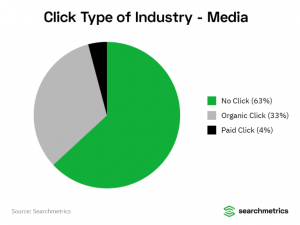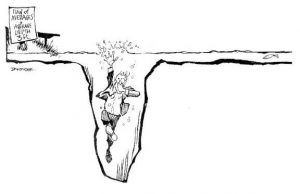When running a business, there are a million things to plan, schedule, and worry about. You have products or content to produce. You have financing to secure. You may need to hire contractors or employees. Under such a constant time crunch, you may be tempted to put off things like “building a website” until you are more established.
Don’t even think about it!
Credibility, visibility, convenience and leads are a few of the benefits of having a business website. Without a website, your business has limited control over its online presence and you must rely on third parties to correctly provide limited information.
However, a new report shows that 46% of small businesses do not have a website. Small, medium or large your business should have a website. Don’t get caught up making excuses, it should be your priority to have an effective online presence.
Your website could be your business’s most important asset, so do not put it off. The sections below explain why a website is crucial in today’s marketing environment, and then walk you through how to improve your site’s effectiveness.
Why Your Website Is So Important
There are numerous reasons you should never try to run your business without investing in a website. Here are just a few:
- Credibility
- Cost Effectiveness
- Time Savings
- 24/7 Accessibility
Each of these points is examined in detail below.
A Website Gives Your Business Credibility
Your website is usually a point of first contact for your customers, and it is an opportunity to make a great first impression. A well designed website assures your customers that you are not some sketchy operation. It indicates that you are an established business that has invested the time and money to create a (hopefully) permanent online presence.
Note the inclusion of the phrase ‘well-designed website.’ It is vital that your site appears professional and provides the customer with a great user experience.
If a website is not intuitive and easy to use on both desktop and mobile devices, customers will abandon your site for a competitors. Make it easy for your customers to accomplish their desired needs, establish what your users use your site for and present these features outright.
A professionally designed website inspires confidence. This is particularly important if you run a micro- or home-based business. Since you do not have a storefront that customers can see, your website therefore becomes your primary showplace.
A Website Is Cost Effective Promotion
A website is one of the most inexpensive ways to promote your business. It gives you global reach and, compared to other promotional channels, a website is extremely cost effective. Beyond the initial investment, a website can provide a continual return on investment (ROI) for years to come.
In fact, there are significant costs to NOT having a business website. A website provides a place for customers to learn more about a business, what it offers, and how to contact the business for more information. A business cannot acquire these new customers if there is not a reputable website to provide this information. Without a website a business is losing potential customers, a significant cost in today’s competitive environment.
A Website Offers Time Savings
A good website lets you provide information to customers without having to respond to emails, phone calls, or other direct inquiries. You can answer Frequently Asked Questions, provide a portfolio or image gallery to showcase your work, and include testimonials from satisfied customers. All of this frees you up to concentrate on other aspects of your business instead of responding to continual questions.
A Website Is Open 24/7
Your website is always accessible, even when your business is closed and you are otherwise occupied. In other words, your customers can shop or find the information they seek at their convenience, rather than at yours. This leads to more sales, happier customers, and an improved bottom line.
How to Improve Your Website’s Effectiveness
To take advantage of all the benefits a website can provide, you should focus on several important areas to improve its effectiveness:
- Analytics
- User Experience (UX)
- Content
- Branding
- Storytelling
Pay Attention to Website Analytics
A good website analytics tool (like Google Analytics) lets you track your website visitors and see the following:
- Where they are coming from
- How long they stay
- What pages they view
- From which pages they leave your site
This gives you insight as to which promotions are working—i.e. driving traffic to your site—and which ones are not. It lets you see which pages are drawing the most traffic, so you can try to replicate their success. It also lets you discover potential trouble spots—pages with high exit rates may be driving your visitors away for some reason. Inspect those pages for anything that might be alienating your customers.
Armed with this information, you can plan future marketing efforts. Nurture the effective channels, and massage the channels that do not seem as effective.
Offer a Great User Experience (UX)
User Experience (UX) can be a nebulous concept for new website owners, but the Usability Professionals Association offers this definition: UX is “every aspect of the user’s interaction with a product, service, or company that make up the user’s perceptions of the whole. User experience design as a discipline is concerned with all the elements that together make up that interface, including layout, visual design, text, brand, sound, and interaction. [It] works to coordinate these elements to allow for the best possible interaction by users.”
In other words, your website menu structure should be intuitive, your design should be attractive, information should be easy to find, and users should be able to achieve what they want to achieve on your site without undue complications.
This also means you should eschew industry jargon in favor of clear language, avoid unnecessary distractions like slideshows, and leave out annoyances like self-starting videos. Keep your site clean, simple, and—most importantly—as useable as possible.
Offer Great Content
Make sure you provide engaging and information-rich content. Nothing is as frustrating to users as visiting a site for answers and finding trivial—or zero—information.
In addition to the content itself, pay attention to how you present it. Organize your content in a sensible, easily digestible way. Use topic headings and bullet lists so that readers can scan a page to find what they want quickly. Leave reasonable amounts of white space on a page instead of filling it with dense blocks of intimidating text.
Maintain Consistent Branding
Consistent branding acts as a roadmap for your visitors. It tells them where they are and reassures them that they have found the place they want to be. Moreover, it lets you present your site so that your visitors perceive your company in the way you want. Make sure the tone, or personality, of your site does not vary.
For instance, if you run a hunting and fishing outfitter, your visitors will expect camouflage backgrounds and snapshots of still lakes and greenspaces. Thus, your pink and chartreuse color scheme might be off-putting to potential customers. Even more off-putting would be if every page of your site had a different theme.
Keep your color scheme, logos, and other graphics consistent and appropriate.
Tell Your Story
When you ‘tell your story,’ you distinguish yourself and your company from your competitors, and you give your visitors a reason to bond with you. What makes you unique and different? What is your mission? Who do you hope to serve, and how? How did you come to be in business?
Just as important as your story is your promotion of it. Entrepreneur.com contributor Joanna Lord writes, “Is your company’s story tucked away in the footer of your website with an ‘Our Story’ link? If so, it’s time to give your story greater visibility. Ideally, your story should be laced throughout the text on your entire site…”
She suggests that you “give it more real estate.” Put in on your home page, write about it on your blog, and link to it from your company’s social profiles. “Make your story a critical part of that interaction. Link to videos or website pages that help your followers understand what makes you special.”
Stop Putting It Off
If you have not already built a website for your business, stop putting it off and create a web presence. It gives your company instant credibility, and acts as a cost effective promotional tool. It saves you time, and is always accessible to potential customers, even when your business is closed and you are eating dinner, on vacation, or sound asleep.
Once you make the decision to get your business online, make sure you pay attention to website analytics to find out what you are doing wrong—and right! Offer your visitors a great user experience, and engaging, useful content. Maintain consistent branding throughout your site, so you don’t confuse your customers. And always tell your story—how are you different, and what makes your business unique?
Take advantage of your business’s most important asset, and it will take care of you.
Digital & Social Articles on Business 2 Community(100)








